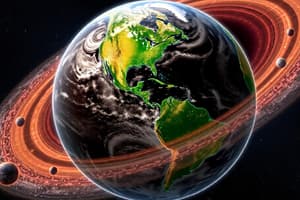Podcast
Questions and Answers
Mars has very little volcanic activity compared to ______.
Mars has very little volcanic activity compared to ______.
Venus
The early atmosphere of Earth did not contain ______ gas.
The early atmosphere of Earth did not contain ______ gas.
oxygen
The organisms that thrived in extreme conditions on Earth were called ______.
The organisms that thrived in extreme conditions on Earth were called ______.
extremophiles
The first organisms that could produce oxygen gas through photosynthesis were ______.
The first organisms that could produce oxygen gas through photosynthesis were ______.
Oxygen levels rose to their current levels about ______ million years ago.
Oxygen levels rose to their current levels about ______ million years ago.
Only one planet in the solar system can support life, which is the ______.
Only one planet in the solar system can support life, which is the ______.
The star that must survive long enough for planets to develop life is a medium-mass ______.
The star that must survive long enough for planets to develop life is a medium-mass ______.
For a planet to be habitable, it must be located in the ______ Zone.
For a planet to be habitable, it must be located in the ______ Zone.
Mercury experiences extreme temperatures due to its slow ______.
Mercury experiences extreme temperatures due to its slow ______.
Venus has a very thick atmosphere that increases the ______ effect.
Venus has a very thick atmosphere that increases the ______ effect.
Mars, Jupiter, Saturn, Uranus, and Neptune are very ______ due to their distance from the sun.
Mars, Jupiter, Saturn, Uranus, and Neptune are very ______ due to their distance from the sun.
The amount of heat and solar energy received by Earth keeps its temperature from being too ______ or too cold.
The amount of heat and solar energy received by Earth keeps its temperature from being too ______ or too cold.
The early Earth was capable of sustaining liquid ______, which increased the possibility of life.
The early Earth was capable of sustaining liquid ______, which increased the possibility of life.
Flashcards are hidden until you start studying
Study Notes
Earth's Unique Capability to Support Life
- Earth is the only planet in the solar system that can support life due to specific conditions.
- A medium-mass star, like the sun, can last long enough for life to develop on orbiting planets.
- Located in the Goldilocks Zone, Earth maintains a temperature suitable for liquid water, a crucial element for life.
Importance of Liquid Water
- Water remains in liquid form, essential for life, due to Earth's optimal distance from the sun.
- Too much heat from the sun vaporizes water, while too little heat can freeze it, both of which are avoided on Earth.
Comparison with Other Inner Planets
- Mercury's proximity to the sun leads to extreme temperature fluctuations due to its slow rotation and thin atmosphere.
- Venus has a thicker atmosphere enriched with volcanic activity, causing a strong greenhouse effect and very high surface temperatures.
- Mars has a cold surface with a thin atmosphere, largely due to minimal volcanic activity.
Conditions of Outer Planets
- The Jovian planets (Jupiter, Saturn, Uranus, Neptune) consist mainly of gases, lacking solid land for organisms to inhabit.
- Their great distance from the sun results in insufficient solar energy, producing very cold environments.
Early Life and Conditions on Earth
- In 1952, scientists Stanley Miller and Harold Urey simulated early Earth conditions, indicating that life began in the oceans.
- Extremophiles emerged in Earth's harshest conditions, thriving under high pressure, extreme temperatures, and acidity.
Oxygen Production
- Early Earth had an oxygen-free atmosphere; oxygen levels rose significantly around 600 million years ago.
- Cyanobacteria, the first photosynthetic organisms, generated oxygen gas, contributing significantly to atmospheric changes.
- Current scientific understanding remains uncertain regarding the exact causes of the rise in oxygen levels.
Studying That Suits You
Use AI to generate personalized quizzes and flashcards to suit your learning preferences.




